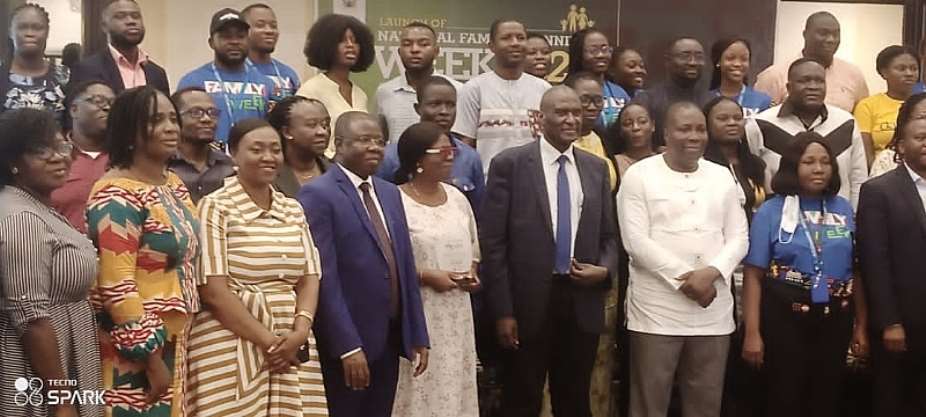Ghana Health Service (GHS), as part of the annual celebration of World Contraception Day to improve awareness of all contraceptive methods available and to enable young people to make informed choices on their sexual and reproductive health, has launched ATOUA TV Series.
ATOUA literally meaning “should it happen to you!” in the Akan language seeks to increase the practice of modern family planning methods through the education of young people on their reproductive health, highlighting the risks and unhealthy decisions that can affect their aspirations.
The event was organized in collaboration with the UNFPA, Marie Stopes Ghana, PPA Ghana, with funding from Global Affairs Canada and other development partners.
This year’s celebration saw the launch of National Planning Week and the ATOUA TV Series under the theme; “Breaking Myths and Misconceptions on Family Planning”.
It is in response to addressing the increasing rate of teenage pregnancies and low reproductive health services including family planning uptake by young people.
Delivering the keynote address at the launch, Dr. Kofi Issah, Director of the Family Health Division of the GHS, said, despite vast knowledge of family planning, the practice of modern contraception has been low.
He said, this is as a result of fear of side effects, rumours, myths and misconceptions about the use of modern family planning methods.
Again, poor attitudes of health workers and provider are also deterrents to utilization and efforts being made to address this.
According to him, data available indicates that about 90% of the population are knowledgeable about maternal health services and family planning service, however practice of contraception remains low at 25% of married women for modern methods, whilst 62% of adolescents who are sexually active have an unmet need for family planning (GMHS 2017).
He said, as part of the public awareness for acceptance of family planning services, this year’s celebration focuses on dispelling myths and misconceptions by advocating increased commitment to family planning as an essential component of national health and socio-economic development.
UNFPA Country Representative, Mr Yisa Barnabas explained that the launch is expected to break myths and misconceptions in Ghanaian society.
"When you have myths like if you use family planning, the woman can never be pregnant again. If you use family planning, you will get cancer. If you use family planning no man will look at you. If you use family planning then the woman will refuse you. If you use family planning then you are not confined. You're not conforming to our cultural norms and family guidance with all this myth. How do we proceed? That is the purpose of this week."
Mr. Yisa Barnabas said it is expected that the public will accept the use of family planning methods to address SRH issues.
Mr. Joseph Aidoo, representative of Marie Stopes Ghana, said, everyone from whatever background, should be able to choose whether and when to have children, hence access to information on sexual and reproductive health services is key.
According to him, 55% of Ghana’s population of whom are aged under 24, and one-in-five is adolescents (aged 10-19), 20% of all women and 57% of adolescents (15-19years) still report an unmet need for family planning.
He said this year’s theme is in line with addressing the several socio-cultural issues across communities that continue to hinder women and girls’ access to family planning services.
He pointed out that the inclusion of family planning on NHIS has given an essential insight that removing cost alone is not enough to advance access but develop and implement strategic SBCC interventions to address myths and misconceptions while also building critical partnerships with other national development sectors.
“In that regard, Marie Stopes Ghana commits to contribute to achieving gender equality and universal health coverage in Ghana by enabling women to have access to accurate information that will empower them to choice and bodily autonomy.”






 We’ll no longer tolerate your empty, unwarranted attacks – TUC blasts Prof Adei
We’ll no longer tolerate your empty, unwarranted attacks – TUC blasts Prof Adei
 Bawumia donates GHc200,000 to support Madina fire victims
Bawumia donates GHc200,000 to support Madina fire victims
 IMF to disburse US$360million third tranche to Ghana without creditors MoU
IMF to disburse US$360million third tranche to Ghana without creditors MoU
 Truck owner share insights into train collision incident
Truck owner share insights into train collision incident
 Paramount chief of Bassare Traditional Area passes on
Paramount chief of Bassare Traditional Area passes on
 Two teachers in court over alleged illegal possession of BECE papers
Two teachers in court over alleged illegal possession of BECE papers
 Sunyani: Victim allegedly shot by traditional warriors appeals for justice
Sunyani: Victim allegedly shot by traditional warriors appeals for justice
 Mahama vows to scrap teacher licensure exams, review Free SHS policy
Mahama vows to scrap teacher licensure exams, review Free SHS policy
 Government will replace burnt Madina shops with a new three-story, 120-store fac...
Government will replace burnt Madina shops with a new three-story, 120-store fac...
